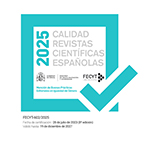El fact-checking como estrategia global para contener la desinformación
Resumen
Las organizaciones de fact-checking están imponiendo unos sistemas de verificación que deben ser evaluados para diseñar futuras estrategias de contención de las fake news. El objetivo de este artículo es describir dichos sitemas para ahondar en la comprensión de los mensajes dudosos para la ciudadanía. Para ello, se han analizado 2.894 registros de la base de datos de Newtral correspondientes a 2018 y 2019 al completo. En concreto, se ha examinado el porcentaje de contenido falso y verdadero, las fuentes de difusión y de verificación, el tiempo empleado en la comprobación y los temas de los mensajes verificados. Se concluye que hay más mensajes fraudulentos que auténticos y los medios de comunicación son la principal fuente de difusión de mensajes dudosos. Además, las fuentes gubenamentales son la primera fuente de verificación, prevalece la credibilidad sobre la inmediatez en el proceso de fact-checking y la política es el área temática que genera más bulos.
Descargas
Descarga artículo
Licencia
La revista Estudios sobre el Mensaje Periodístico, para fomentar el intercambio global del conocimiento, facilita el acceso sin restricciones a sus contenidos desde el momento de su publicación en la presente edición electrónica, y por eso es una revista de acceso abierto. Los originales publicados en esta revista son propiedad de la Universidad Complutense de Madrid y es obligatorio citar su procedencia en cualquier reproducción total o parcial. Todos los contenidos se distribuyen bajo una licencia de uso y distribución Creative Commons Reconocimiento 4.0 (CC BY 4.0). Esta circunstancia ha de hacerse constar expresamente de esta forma cuando sea necesario. Puede consultar la versión informativa y el texto legal de la licencia.










